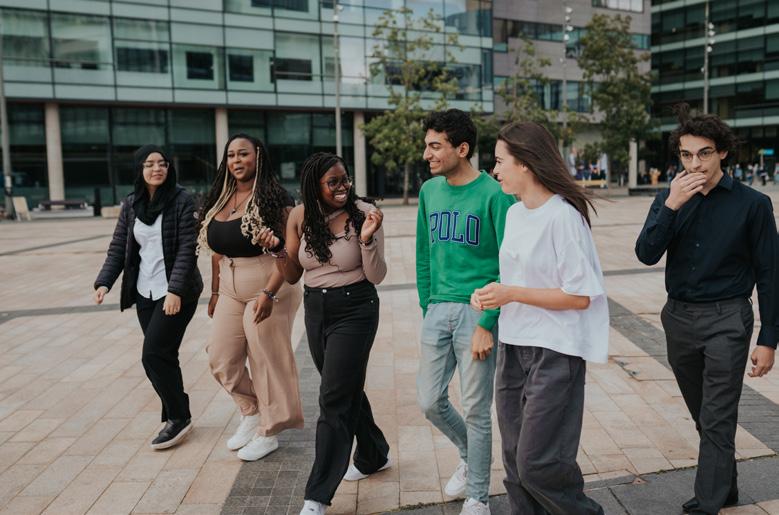

YOUTH VOICES
The Youth Leads UK Leadership Programmes help young people develop their skills and make a difference. Here’s what some of our young people have to say:
“The Leadership Programme has been a great opportunity to meet new people and build personal and professional skills. I have really enjoyed my time!”
Farzana, 22
“Being part of the Youth Leads UK’s Leadership Programme has been an invaluable experience. It equipped me with essential skills, allowed me to create meaningful connections, and provided me with opportunities to make a positive impact as a young individual. One of my favourite highlights was the fashion shoot, I truly enjoyed being part of it and the Youth Leads family now!”
Raza, 17
WELCOME TO YOUTH LEADS MAGAZINE!
This isn’t just a magazineit’s your space, your voice, and your power. Youth Leads Magazine is brought to you by Youth Leads UK, the charity that’s all about helping young people like you thrive. Whether it’s training in media, business, or employability skills, we’re here to guide you from dream to reality.
This magazine showcases the talent of young peoplewriting, photography, design, and more - all created to inspire and empower. Outside these pages, we’re making waves across the UK, helping thousands of young people land jobs, ace interviews, and unlock their potential.
We’re proud to do what we do, and even prouder to have been recognised by decision-makers and the Royal Family. Want to get involved, join our team, or support our work? Head to youthleads.uk to find out more!
HERE’S TO MORE PAGES, MORE VOICES, MORE POWER. LET’S GET STARTED!
DISCLAIMER
LUNCH WITH THE CEO
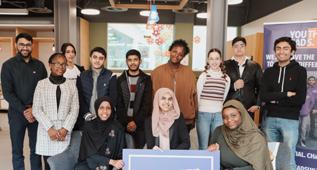
Our young people had an exciting opportunity to network with our CEO, learn more about his journey in setting up Youth Leads UK and hear about the challenges and successes as a young Chief Executive.

Our Civic Youth Steering Group launched their ‘Empowering Young Citizens: The Future is Now!’ resource pack which is designed to inspire and educate young people about civic engagement and leadership roles within their communities.
YOUTH ADVISORY BOARD

We officially appointed our Youth Advisory Board members with a special celebration. We heard an inspiring speech from our CEO Saeed alongside tea, cake, and excellent conversations about the future of the organisation and this exciting next chapter!




FIGURING OUT YOUR FUTURE
By Farzana Begum
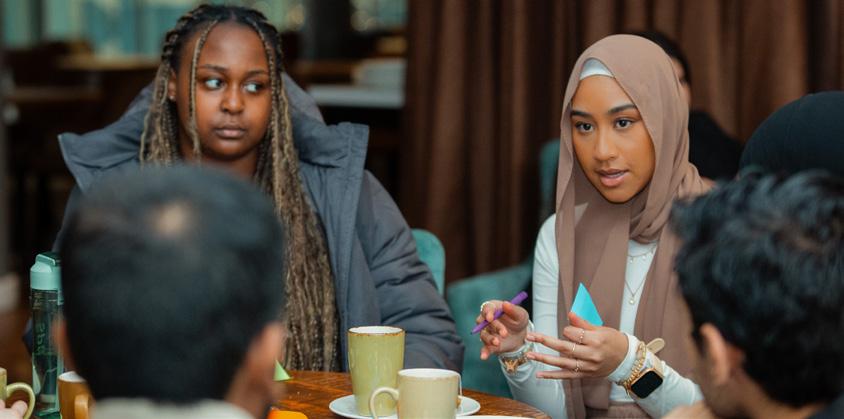
Are you in school, college, university, full-time employment, or somewhere in between? Do you feel a bit lost, like you’re missing some sort of direction in life? If this sounds familiar, take a deep breath in, hold, and breathe out.
Unclench your jaw and keep reading – this advice is for you!
You might feel like everyone around you seems to know what their calling is, like they have their path figured out, while you’re the only one still uncertain. Trust me, this feeling is very common. With so many paths out there in the big wide world, it can be hard to choose the ‘right’ one. It can also feel daunting to take that first step to explore your options, especially if you don’t have a support system to guide you.
1 2 3 HERE ARE MY TOP THREE TIPS FOR NAVIGATING YOUR FUTURE:
Find a Mentor
One of the best ways to find guidance is to sign up with One Million Mentors!
This organisation can match you with an experienced professional who will help you explore career options, take your next steps, and encourage you to pursue your dreams. Friends and family can be supportive, but tailored guidance from an independent mentor can be especially empowering.
Say Yes to Every Opportunity
Get involved with every opportunity that comes your way. You never know where one experience will lead you or how many doors it might open. Even if something doesn’t seem like it’s quite for you, step outside your comfort zone, try something new, and have fun. It’s all part of the journey, so make it memorable!
Don’t Be Disheartened if Things Don’t Go as Planned
Remember, this journey is about progress, not perfection. Sometimes things don’t work out as we hoped, but that’s just part of life. Put your best foot forward, give 100% effort, and remember that one door closing often leads you down a different, perhaps better, path.
THE ULTIMATE POTENTIAL WITH JD
By Nicole Crook
When I first joined Youth Leads UK, I never thought I’d get the chance to meet Chunkz! But I did in fact meet him at the JD UP event organised by the JD Foundation back in April. Hearing his inspiring story was one of my highlights from the event. He talked about the challenges he faced while building his platforms and emphasised how being consistent and determined helped him achieve his goals. He also answered our personal questions and shared life lessons he wished he’d known sooner
One of my favourite parts of the event was getting a personal insight into JD’s working environment and discovering the different departments that make the brand what it is. The JD Foundation’s vision to support young people in reaching their full potential by building stronger youth communities and transforming lives was clearly showcased throughout this immersive career event.
I can confidently say that all these activities developed my knowledge, and I’m incredibly grateful for the chance to attend. I feel I’m now in an advantageous position when considering potential careers I hadn’t thought possible for my age and current qualifications.
My favourite part of the experience was getting free headshots to start building my modelling portfolio.
The activities on the day included:
• Exploring how JD designs its stores and arranges merchandise
• Learning about the process of designing, buying, and delivering stock to customers
• Experiencing mock photography sets, where you could try being a stylist, photographer, or model
• Listening to industry experts who shared their career journeys and offered advice on how to get involved
I also enjoyed networking with the marketing department, where I hope to complete work experience in the future. Plus, we had the chance to play games where prizes like trainers, food, and vouchers were up for grabs.
Overall, this event showed me just how valuable it is for young people like myself to attend opportunities like JD UP. Events like this benefit you by placing you in an environment where you can connect with people from diverse backgrounds, essentially opening doors to new, fulfilling relationships.
THE JD EVENTS HAPPEN ON AN ANNUAL BASIS, SO KEEP AN EYE OUT, AND REACH OUT TO YOUTH LEADS UK, WHO CAN HELP YOU GET TICKETS AND ATTEND!
LIFE AFTER EXAMS: HOW TO MAKE THE MOST OF IT
By Toni Banjo
So, your exams are over! You’ve handed back your mock paper, celebrated with family, and finally enjoyed a good night’s sleep. But what’s next? Maybe you’ve got a two-week holiday in Tenerife coming up to enjoy your exam-free time, or perhaps you’re searching for a job in a tough job market. Or maybe you’re not doing much of anything and find yourself scrolling endlessly on your ‘For You’ page. No worries - I’m here to share some tips on making the most of this winter break.
WELLBEING

During a break like this, it can feel like you’re standing still while the world keeps spinning. After a while, feeling unproductive or being a full-time couch potato can start to weigh on your mental health. Here are some budget-friendly activities to boost your mental and physical wellbeing:
PRODUCTIVITY & PREPARATION
If your goal for the new year is to feel more prepared for summer, this break is a great time to build confidence in the subjects you’ll be taking exams in. You could go over any bridging work set by exam boards to keep your knowledge fresh.


You might also want to start thinking about your future plans. Here are a few ideas to get started:
• Volunteer at a local holiday club
• Write or update your CV
• Research different career fields
• Enrol in your chosen college or sixthform
Finally, don’t forget to rest and recharge - after all, you’ve just been through weeks of stressful exams, and your mind and body need a break. Be proud of how hard you’ve worked and what you’ve achieved; hopefully, your results will reflect that. Take this time to reconnect with the people you care about and strengthen those relationships. Most importantly, use this break to learn more about yourself and discover what you truly enjoy.

VIDEO GAME ESCAPE


By Amelia Ebrahim


Many people turn to video games as a way to escape the world around them. Whether it’s an action-packed role-playing game or a cosy simulator, video games offer comfort by letting us step into someone else’s life.






Playing as a fictional character gives you the chance to explore their world, whether it’s a twist on our reality or a whole new fantasy one. Some games even let you customise your character to look like yourself, helping you fully immerse in this new world.

This is what I love about video games - the chance to step away from my own life and experience another. Here are my top three games to play when I need a break from reality:
ANIMAL CROSSING: NEW HORIZONS
Animal Crossing is the perfect cosy game for when you just want to relax and unwind. You start by moving to an uninhabited island, which you can transform and customise however you like. And it’s not just the outdoors you can decorate - there are hundreds of items for interior design, plus loads of clothing options to personalise your character! You can also invite cute animal villagers to live on your island; my personal favourite is Gruff.


CELESTE


On the surface, Celeste is a platform game where the objective is to help the player climb a mountain. But it’s so much more than that - the mountain symbolises how mental health challenges can feel. You follow the main character, Madeline, who struggles with anxiety and depression. The game’s real message is about selfacceptance through Madeline’s journey, which I really appreciate. The gameplay can be tough at times, but that’s all part of the experience and adds to the journey.

PERSONA 5: ROYAL



The Persona series is a masterpiece in its own right, but Persona 5 is my favourite. It’s about breaking free from the pressures of society. You play as Joker, who teams up with other teenage outcasts to take down corrupt adults by stealing their “treasure” - a symbol of their twisted desires. The game perfectly balances life simulation with turn-based fantasy combat in the Metaverse. The soundtrack is also amazing, filled with different jazz subgenres that make it unforgettable.








I hope you’ll try out these games and discover the same qualities in them that I have. Happy gaming!



MILAN: WHERE FASHION MEETS FLAVOUR!
By Raza Ali
Milan - the fashion capital of Italy! According to Lit Mag, Milan isn’t just Italy’s fashion capital; it’s also ranked fourth worldwide for fashion. It’s the wealthiest city in Italy and an important financial centre in Europe, making it a hotspot for fashionrelated businesses. But that’s not all! Italy is famous for its exquisite cuisine, and I must say my trip to Milan confirmed this reputation.



FOOD IN MILAN
There are plenty of places in Milan where you can enjoy the authentic flavours of Italian food. My family and I had a fantastic dinner at PizziKotto, a pizza restaurant with two locations in Milan, which serves delicious, organic pizzas that are filling without being heavy. Their tuna pizza was sensational, and every bite was packed with flavour - it left us wanting more!
If you’re visiting Milan, I highly recommend PizziKotto. If you happen to be near the famous Piazza del Duomo, the Celio branch of PizziKotto is more convenient. Plus, I’d recommend checking out TripAdvisor’s list of the best restaurants in Milan, so you can explore even more top dining spots!
FASHION IN MILAN
Experiencing fashion in Milan was something else and it truly stands apart from the rest of Italy. There are countless displays advertising highstreet brands, luxurious storefronts on exclusive streets, prestigious fashion institutions like Istituto Marangoni, and crowds of shoppers strolling the streets with their designer bags. And, of course, high-end cars regularly cruise around the city.
If you want to experience Milan’s best shopping gallery, head to Galleria Vittorio Emanuele II, located right by the Piazza del Duomo. It’s filled with high-end brands, the latest fashion trends, and rich culture. Streets like Via della Spiga and Via Monte Napoleone have a particularly stylish vibe, with other luxury shopping options nearby. Milan is famous for its fashion shows and events, and if you love fashion, you should visit Milan at least once in your life for the ultimate experience.


Highlight from My Trip
In February, when I visited Milan with my family, we made sure to stop at the famous Lake Como - a place most of us have only seen on social media or in films. After seeing so much urban development around Milan, Lake Como was truly breathtaking, showcasing Italy’s natural beauty. If you’re ever in Milan, make sure you don’t miss out on the chance to visit Lake Como!
DO WOMEN BELONG IN FOOTBALL?
By Kevina Lajara

‘THE BEAUTIFUL GAME’, AS FOOTBALL IS SO FONDLY KNOWN BY FANS, IS A SPORT LOVED BY MILLIONS. EVERY WEEK, MEN AND WOMEN GATHER FOR 90 MINUTES TO CHEER ON THEIR FAVOURITE TEAMS. RECENTLY, THOUGH, DISCUSSIONS AROUND SEXISM, MISOGYNY, AND WHETHER FOOTBALL IS TRULY OPEN TO WOMEN HAVE SPARKED WITHIN THE SPORT.
A CULTURAL CRAZE
A 2021 study found that 70% of People who watch the Premier League are male. While the number of female fans is growing, most football supporters are still men. This relates to the concept of ‘hegemonic masculinity,’ which is a set of societal standards suggesting the “ideal” man is assertive, courageous, and unfazed by challenges. It’s a stereotype that pressures men to act in specific ways and can isolate those who don’t fit the mould. Even in today’s more open society, traits like physical strength, competitiveness, and dominance are often celebrated in men - and these are all characteristics linked to football, which may explain its strong appeal to male fans.
“IT’S A MAN’S GAME!”
Hegemonic masculinity also leads to the expectation that boys will follow football. Many boys are brought up to think of football as a “man’s sport,” and those who aren’t interested may even face bullying or be labelled as “unmanly.” This can lead to “hyper-masculinisation” within football culture, where some fans feel the game is strictly a men’s domain. This outlook, often rooted in sexism, can sometimes result in women being looked down on or discouraged from joining the game.
To learn more, visit their website: hergametoo.co.uk
There’s more than enough room for everyone in football. Let’s support our teams wholeheartedly and appreciate everyone else who does the same. Football is for everyone!
FOOTBALL IS FOR ALL
The good news is that attitudes are shifting. According to the BBC, the Women’s Euros in 2022 saw record viewership, showing that people are increasingly interested in the women’s game. We can keep this progress going by supporting our local women’s teams, buying their merchandise, and advocating for more investment in girls’ football. Campaigns like ‘Her Game Too’ are also helping to tackle sexism in the sport, promoting a welcoming space for everyone who loves the game.


EMBRACING MY DEEN, EMBRACING MY DESTINY
By Marzana Begum
Growing up as a Muslim girl, I’ve had to navigate a unique set of expectations and pressures. From my parents’ hopes for me to excel academically to upholding traditional values to society’s misunderstandings about Muslim women. It can feel like I’m constantly performing a balancing act between different worlds.
At home, I’m expected to be a dutiful daughter, a dedicated Muslim, and a future wife and mother. But out in the world, I’m confronted with a different set of norms and expectations. I’ve had to grapple with stereotypes that portray Muslim women as oppressed or backward and prove that being a Muslim doesn’t mean sacrificing my individuality or aspirations.
Despite these challenges, I’ve learned to find a balance between honouring my faith and staying true to myself. My religion is a source of strength and guidance, not a set of restrictions. I’ve discovered that being a Muslim means pursuing knowledge, developing my talents, and making a positive impact on the world.
In fact, my faith has taught me the importance of selfdiscovery and personal growth. It’s been a journey filled with ups and downs, as I’ve tried different hobbies and activities such as knitting, crocheting, painting and even learning to play the violin to figure out what truly excites me. And you know what? It’s okay if I’m still not sure what I want to do with my life. I’m only 15, after all!
What’s important is that I stay true to my values and focus on my own goals and aspirations. I find inspiration in the stories of strong, accomplished Muslim women like Rashida Tlaib and Nadiya Hussain who have broken barriers and paved the way for others like me.

I know that the pressures I face today are temporary, but the lessons I’m learning will stay with me forever. I’m embracing the uncertainty and trusting that my path will unfold in its own time. And who knows? Maybe I’ll end up doing something completely unexpected and amazing, becoming a Muslim girl who defies expectations and blazes her own trail!
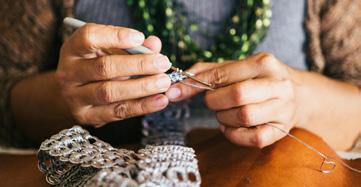
FASHION
In this feature, we’re redefining the professional look to keep up with your dynamic lifestyle. Get ready to dive into sleek and stylish outfits that effortlessly transition from power-packed days at school or work to fun hangouts with friends!


Effortlessly cool and confident: This tailored brown suit is all about making moves with style. Sharp yet relaxed, it’s the perfect combination for owning your space, whether you’re handling business, or bringing the fun!
FARZANA


Work hard, chill harder: Keep it fresh with a striped shirt and sharp trousers that mean business, balanced with trainers for a relaxed vibe. Pair with a watch and sunglasses to top off the “cool and confident” look!


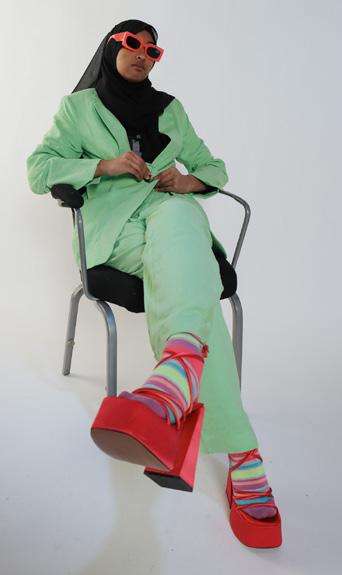

Blazer - £24.50 ASOS
Trousers - £17.00 ASOS
Sunglasses£20.00 ASOS
Heels - £11.50 ASOS
MARZANA
Boss energy meets bold vibes: This lime green suit is serving serious power moves, paired with eye-popping red heels and rainbow socks for a playful twist. Mix in sharp sunglasses to keep it cool. Who says professional can’t be fun?


ANASTASIA
Vintage vibes with a modern twist: A sleek black dress gets an upgrade with bold red lace tights and metallic heels that pop. Add in hair clips and stacked bracelets for a unique mix of edgy and elegant.
Dress - £45.99 ASOS
Tights - £10.00 Zara
Heels - £28.00 ASOS
Hair Clips£6.00 ASOS
Fashion Editors: Kevina Lajara and Amreece Samra
Photographed by Eden Castillo
Instagram: @edoniastar

WHY SEEING A DENTIST MATTERS: A GUIDE FOR TEENS
By Raees Boriyawala
Your smile is one of the first things people notice about you, so keeping it healthy is important. But these days, many young people in the UK are finding it harder to see a dentist. Why is that happening, and what can you do to keep your smile bright?
WHAT’S GOING ON WITH DENTAL CARE?
Imagine having a toothache and discovering that your local NHS dentist isn’t taking new patients. Frustrating, right? This is happening across the UK. Whether it’s long waiting times or a complete lack of availability, getting a dental appointment is becoming a real challenge.
HERE’S WHY THIS IS HAPPENING:
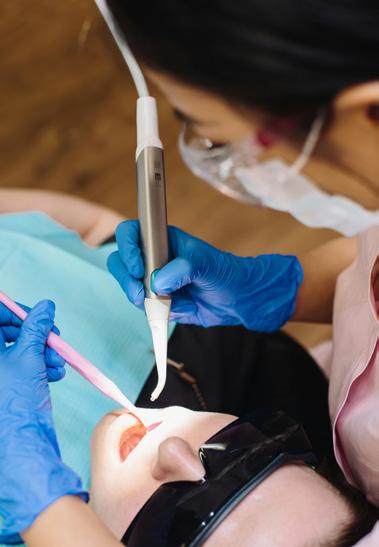
• Not Enough Dentists: Many dentists are retiring early or moving to private practices, where they can earn more. This leaves fewer dentists available for NHS patients.
• Location Issues: If you live in a big city, you might have more options. But in rural or coastal areas, finding an NHS dentist can be much harder. These areas are often called “dental deserts” because they have so few NHS services.
• Funding Challenges: Dentists often earn more in private practice than through the NHS, which is why many are leaving the public system.
WHY DOES THIS MATTER?
You might wonder why this is such a big deal. Well, having access to a dentist means you can keep your teeth and gums healthy, which is crucial for your overall health. Problems like tooth decay can lead to pain, infections, and even more serious health issues down the line.
Plus, being confident about your smile matters. Whether you’re hanging out with friends, giving a presentation at school, or just feeling good about yourself, healthy teeth can make a big difference.

WHAT CAN YOU DO?
While you can’t fix the shortage of dentists, there are things you can do to look after your dental health and help raise awareness:
• Talk About Dental Health: If you notice that it’s tough to get a dentist appointment, speak up! You could raise awareness at school or on social media. The more people know about the issue, the more likely it is that change can happen.
• Get Involved: See if there are local or national campaigns focused on dental care. You could join a campaign, sign a petition, or even start a conversation in your community about why dental access matters.
• Take Care of Your Teeth: Be consistent with brushing and flossing, and go to dental check-ups when you can. The better you take care of your teeth now, the less likely you are to need urgent dental care later.
THE BIGGER PICTURE
Dental health isn’t just about having a nice smile - it’s about staying healthy and feeling confident. When you take care of your teeth and help others do the same, you’re contributing to a healthier community. Plus, by getting involved in conversations about dental care, you’re helping to ensure everyone has access to the services they need.
So next time you brush your teeth or look in the mirror, remember that you have the power to make a difference, not just for yourself, but for others too. Let’s keep those smiles bright, one tooth at a time!
MORAL MINEFIELD:
Immigrant Parents’ Perspective on the UK’s Education System
The names in this article have been changed to protect privacy, but the stories and experiences are real.
By Asad Ali Butt
In the diversity of modern Britain, an unseen struggle is playing out in schools. Migrant parents, full of hope for their children’s futures, often find themselves grappling with an education system that can feel unfamiliar and sometimes overwhelming. With young minds shaped by the curriculum, many parents are asking: Is there a balance between teaching progressive values and respecting cultural traditions?
Take Amira, a 14-year-old of Pakistani heritage. She comes home from school with questions about gender identity that leave her parents unsure how to respond. Then there’s Michael, originally from Nigeria, struggling to deal with his teenage son questioning their long-held religious beliefs. These aren’t oneoff cases. They represent a wider issue faced by families.
BALANCING INCLUSION AND CULTURAL VALUES
The UK’s education system is known for its openness, aiming to prepare children for life in a diverse world. But some parents feel the approach leaves them on the sidelines.
“It’s like walking through a minefield,” says Mrs Patel, a mother of two. “We want our children to succeed, but we’re also scared they’ll lose touch with our family values.”
The Personal, Social, Health and Economic (PSHE) curriculum is designed to give students the tools they need for modern life, and it covers topics like gender identity and sexuality that some families feel are introduced too early or clash with their traditions.
It’s not just these lessons that spark concern. For some, the way global issues are highlighted feels selective. “When my daughter’s school raised the Ukrainian flag, I couldn’t help but wonder why no one mentioned the atrocity going on in Palestine,” says Mr Abdel, a Palestinian refugee. “It seems like some causes get more attention than others.” For many parents, this imbalance can make the education system feel disconnected from the communities it serves.

BRIDGING THE GAP
How can schools strike the right balance?
Here are three ways forward:
BETTER CONVERSATIONS
Schools and parents need to communicate more openly. By explaining the reasons behind lessons and listening to parents’ concerns, schools can ease worries without diluting the curriculum.
BROADER PERSPECTIVES
Including people from different backgrounds in shaping lessons could help ensure the curriculum reflects Britain’s diversity more fully.
LIFE SKILLS FIRST
Focusing on universal skills like empathy, critical thinking, and resilience might help bridge gaps between different cultures and prepare young people for the future.

Young people have a key role here too. After all, it’s our generation that will shape tomorrow’s society. Do we want a system that forgets cultural differences or one that finds strength in them?
The decisions made today will ripple through the next generation. By finding solutions that respect all voices, we can create schools where every student feels seen, supported, and ready to take on the challenges of modern life—while staying rooted in what makes them unique.
THE CRUELTY-FREE CRISIS
By Kimi Humphreys
We all have ethical beliefs – whether it’s not supporting the meat industry, avoiding fast fashion, or simply believing that people shouldn’t suffer. For me, it’s cruelty-free shopping. This means choosing products that haven’t been tested on animals to ensure their safety. Animal testing is common, especially in the cosmetics, personal care, and cleaning products industries. But what does this involve?
Animal testing is any scientific experiment where a live animal is often made to endure something that causes pain, suffering, distress, or lasting harm. Most of these animals are killed and dissected after the experiments are over. These tests are meant to check if chemicals are safe for humans and can involve force-feeding harmful substances to animals or surgically removing organs or tissues to cause deliberate damage. This is unacceptable, and to help stop it, we need to take action.

SO, WHAT CAN WE DO?
This is where shopping cruelty-free comes in. Shopping cruelty-free can be challenging, as many popular cosmetic and hygiene brands still test on animals. However, there are well-known brands that do not, including Rare Beauty, E.L.F., and Charlotte Tilbury. Many smaller brands also prioritise ethical practices, ensuring they are not only cruelty-free but also vegan and committed to fair wages and safe working conditions. Some examples include Concrete Minerals, dome BEAUTY, and Fior Minerals. Websites like ‘Cruelty-Free Kitty’ and ‘Logical Harmony’ provide detailed lists of brands to support or avoid and have filters for different types of products. Often, products like toothpaste and pet food are overlooked when checking for cruelty-free status, but these resources help prevent unknowingly supporting animal testing.
There is one more step to take when shopping cruelty-free: checking for certification. Fortunately, this is easy. All you need look out for is the logos on the product packaging. Here are the only three logos that officially certify a product as cruelty-free:

If you don’t see one of these three logos, it might be a fake certification. Many brands use drawings of rabbits or phrases like “cruelty-free,” but these are not regulated and don’t confirm true cruelty-free status. Even if a company claims not to test on animals, the absence of one of these trusted logos could mean otherwise. To be certain about these logos and any claims on packaging, it’s best to research companies online and refer to the reliable lists on the websites mentioned above.
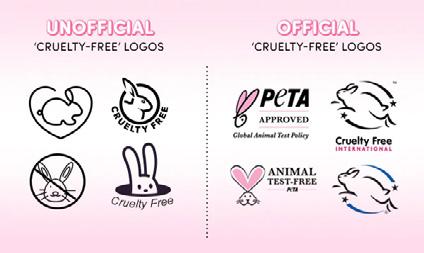

THE WORLD IS GOING TO END IN 2025
By Ummay Shabbir

How many times have you seen a headline, taken it as the truth, and moved on? How often do you get all your information from social media without thinking to fact-check it? We’ve all done it - read a catchy headline and then told our friends that the world is about to end. It sounds dramatic, but what if everything you read isn’t actually true? Misinformation spreads like a disease through word of mouth, and it could be affecting you and your friends more than you realise.
Remember sitting in English class, thinking, “When am I ever going to need this? Maybe the author didn’t mean anything by it!” Well, that’s where you’re mistaken. The writer’s intention is important, and learning to spot it can help you make sense of news articles and social media posts. Being able to identify bias is the first step in understanding what you’re reading. It helps you pause, question, and research those so-called facts. Bias can be conscious or unconscious and is often subtle, leaving you wondering, “How did I end up so far from my original beliefs?” When your English teacher helps you spot hidden signs of misogyny or racism in the texts you study, they’re training you to detect bias. Questions like: Who wrote this? Why did they write this? Who is it for? are what you should ask whenever you read something new.
So, what can we do about it? Let’s be more aware of what we read and hear. The next time you see a headline, don’t just scroll past, read the article and see what really happened. If TikTok is flooding you with news, how much of it can you confidently say is true? If you come across something, check if it’s backed up by statistics. Even then, ask yourself: were those statistics accurate? Were they chosen with bias? For instance, someone once told me that domestic violence rates were higher among lesbians. What does that make you think? That women or lesbians are generally more abusive? If so, you’d be wrong. A closer look shows that those statistics didn’t distinguish between abuse experienced by female partners versus male partners. See how that changes the perspective?
When a friend tells you something they heard, ask where they got it from and research it together. Start making a habit of being mindful about what you take in. Always research what you see, question it, and encourage those around you to do the same. I’ve changed the minds of many simply by suggesting they do a bit of research, and they’ve come back amazed. The internet is not your friend, but you can use it to your advantage if you’re careful. Make sure you check multiple sources before reaching your conclusions. Do it before you find yourself being called out for spreading false information.

SPARTAN WOMEN ARE THE INSPIRATION!
By Aiza Ali

The courageous, strong, and independent women of Sparta have significantly influenced the women of our generation. From the way we exercise to the professions we choose, their legacy has inspired a recognition that women deserve better treatment. Women have fought harder than anyone should have to for basic rights. Today, I’ll break down the roles and rights of Spartan women and explore how they contributed to making Sparta a formidable city.

THEY MANAGED THE HOUSEHOLD
In Spartan households, women were in charge. They managed household finances and made important financial decisions. Additionally, they led religious rituals, praying to the gods for battle victories and abundant harvests—reflecting their significant value in society.
THEY COULD OWN LAND AND PROPERTY
Around the 5th century BCE, Spartan women were granted the right to own land and property—something British women only achieved in 1926. They also had the right to inherit property. This autonomy meant Spartan women were not dependent on men and could sustain themselves if widowed, ensuring their financial security and independence.
THEY WERE EDUCATED BOTH PHYSICALLY AND INTELLECTUALLY
The Spartan lawgiver, Lycurgus, advocated for gender equality. While men attended formal schools for training and education, women were taught by tutors at home. However, when it came to physical education, they trained alongside men, competing in rigorous sports. The primary motivation for educating women this way was the belief that strong, healthy women would give birth to strong, healthy sons. Although the original intention may not have been what we might assume today, it illustrates that a woman’s freedom is vital to building a stable and thriving society.

WOMEN TODAY: STILL WORKING HARD AND RAISING FUTURE GENERATIONS
Women continue to raise us and give life while working tirelessly. To think less of them simply because of physical differences is unfair. Women deserve more recognition for the countless ways they improve society. They contribute far more than the narrow portrayals seen in Hollywood films and old books suggest. It’s time we show women the appreciation and respect they truly deserve for making our world a better place!
LIVING WITH A SKIN CONDITION
By Ruqayya Khan

Hello! My name is Ruqayya, and I’m 18 years old. Ever since I was a baby, I’ve lived with eczema, and my family has supported me for as long as I can remember. Living with this condition comes with many struggles, but I’ve learned a lot along the way, and I want to share my experiences with you.
GROWING UP
I was diagnosed with eczema when I was just two months old. My mum, who had me at 23, found it challenging as a young mother to care for a baby with eczema. She recalls how fussy I was and how often I cried. Starting at the age of 3, I saw a dermatologist regularly, where countless blood and urine tests were conducted to identify any triggers or allergies.
School was difficult. I remember going to school after mornings filled with tears because my skin was sore from a sleepless night of scratching. Being the only child in my class with eczema, I often faced questions from other kids about my skin or noticed them staring out of curiosity. Since I didn’t know what it was like to have “normal” skin, this was my normal.
MANAGING MY ECZEMA AS A TEENAGER
From the age of 16 onwards, managing my eczema became more difficult. Starting college brought new stress, and I had to learn how to control it to avoid flare-ups. This meant taking time for myself to simply breathe and relax or going on long walks alone. Prioritising mental health is crucial when dealing with eczema; if you’re struggling mentally, it will show physically. This is why having support around you during a flare-up is essential, because loved ones remind you of your worth, with or without eczema. I’m still learning to keep my condition manageable, even though it’s always on my mind.
WHAT HAVE I LEARNED?
Do Your Research: Eczema varies from person to person, and many around the world are dealing with different types of it. Plenty of “eczema warriors” share their experiences through blogs, Instagram, and TikTok, offering tips and advice. However, always consult with your doctor before making any major changes. Some TikTok Accounts to Check Out:
• @littlemissplumful: A beauty influencer who balances life as a “skin-fluencer” while dealing with hyperthyroidism and eczema, providing realistic insights into mental health struggles with the condition.
• @rubin_allergy: A board-certified allergy doctor who discusses eczema symptoms and the link between allergies and eczema.
Don’t Build Barriers for Yourself: Never convince yourself that you can’t pursue a certain career or opportunity because of your eczema. I want to work in journalism, a field that involves being in front of the camera, and I’m learning to accept that. Once you come to terms with your condition, you’ll realise that often, the only thing holding you back is yourself. Also don’t forget to talk to people about it when you need it.
Take Care of Your Diet: Avoid relying on junk food; your body needs proper fuel to function, especially since people with eczema often have sensitive immune systems that can react to non-allergenic triggers.
Moisturise as Needed: Find a moisturiser that suits you, whether it’s a cream or an ointment, and keep some with you wherever you go.
My main tip for eczema warriors is to never give up! I know it’s easier said than done, but perseverance and hope are key.

ENGINEERING –IT’S FOR EVERYONE!
By Adam Omar

What’s more rewarding than overcoming challenges no one else could?
From medical breakthroughs and transportation inventions to creating electricity, the internet, and exploring space. Engineers have transformed the world, making our everyday lives easier and revolutionising how we live. As an engineer, you have the chance to make changes that improve the lives of thousands, millions, and even billions of people. Your ideas matter and play a crucial role in shaping the world as we know it.
MISCONCEPTIONS ABOUT ENGINEERING
A common misconception about engineering is that it’s only for people who are naturally brilliant at maths and physics. This simply isn’t true. Anyone can pursue an exciting career in engineering, full of problem-solving and the satisfaction of achieving great things. Don’t let stereotypes like “maths is only for the clever” or “physics is for geniuses” stop you. It’s about deciding whether you’re willing to put in some effort for the potential of a lifetime of rewards. All careers come with challenges, and engineering is no different from the struggles faced by politicians, writers, actors, or artists.
Engineering is an incredibly broad field with a wide range of careers and job opportunities. Another myth is that engineering is only about building mechanical things. In reality, engineers are involved in creating everything from footballs and skyscrapers to complex processes like extracting materials from the earth, producing medicines and food, recycling waste, and generating electricity. Engineers are not restricted to a single path; you can study one branch of engineering and still move into a different one.
BENEFITS OF BECOMING AN ENGINEER
As an engineer, you develop valuable problemsolving skills, mathematical expertise, and teamwork abilities, all of which are highly valued by employers. Engineering skills don’t just advance your career; they transfer to other aspects of your life. Communication, confidence, and time management are among the skills you gain as an engineer, helping you in everything from social interactions to managing your life effectively.
The satisfaction of solving current and new problems is unmatched, and the knowledge you acquire stays with you for life. Your skillset will be broad, and you will constantly be learning and improving yourself. Plus, you get the incredible opportunity to help people and contribute to making the world a better place. What better way to make an impact?
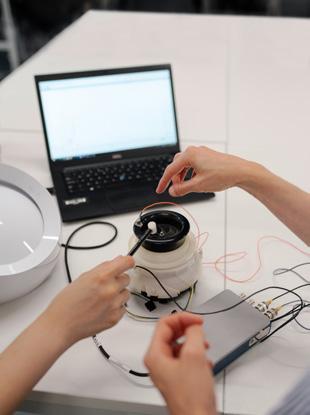
How to Spark Your Engineering Side
After reading this, you might feel more open to exploring engineering and realise it isn’t just for “maths geniuses”. If you’re feeling inspired but unsure where to start, here are some resources to help you explore whether engineering is the right path for you:
- Careers inspiration and guidance for future engineers – Visit Tomorrow’s Engineers on fnb.ink/tomorrow for information and tips.
- Detailed insights into engineering sectors – Check out Prospects on fnb.ink/prospects for explanations about different jobs, required skills, and responsibilities.
- Further education and university courses in the UK – Search for engineering courses at UCAS on fnb.ink/UCAS.
He makes me feel wanted used pressured

Feeling conflicted?
We’re here to listen.
Sometimes, they tell you how much they love you. Other times, they ask you to do things you don’t want to do.
No matter your situation, we’re here when you’re ready. We’re non-judgemental and confidential, 24/7.
FUTURE LEADERS SPEAK OUT!
Just days before the mayoral election, the youth of Manchester had the chance to question and scrutinise the people running to be Mayor of Greater Manchester. This youth-led event began with each candidate giving a brief overview of their plans if elected and the party they represented.
First up was Jake Austin, the Liberal Democrat candidate. He expressed his belief that the current government was failing its citizens and that meaningful change at the local level could better meet the needs of the people. His friendly and approachable manner resonated with the audience, earning him a round of applause at the end of his introduction. Next was Hannah Spencer from the Green Party, who spoke about her relatively recent entry into politics - she was elected as a councillor just last year and continues to work full-time as a plumber. It was refreshing to see someone balancing a day job with a civic role, showing that such opportunities are open to people from all walks of life. Lastly, the now re-elected Mayor of Greater Manchester, Andy Burnham from the Labour Party, reflected on his achievements over the past seven years and expressed his desire to continue his work.
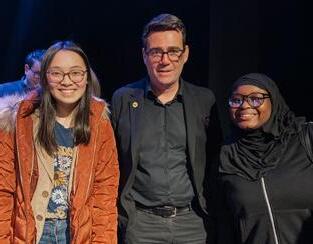
Young people were invited to pose questions to the candidates, focusing on their future plans, especially those concerning the youth in Greater Manchester. Recurring topics included education, public transport, and safety.
One significant debate focused on the relationship between the police and young people. Candidates were asked how they planned to strengthen this relationship and what changes were needed to achieve that.
Andy Burnham noted that while many officers perform their duties well, the actions of a few can tarnish the reputation of the whole force. The other candidates agreed, acknowledging that experiences with the police can vary across different communities. All candidates agreed that improvements were needed and committed to advocating for positive changes within the force.
After an evening full of questions and debate, the event wrapped up, giving attendees the opportunity to take photos with the candidates. Some even secured shadowing work experience opportunities. Whether or not you study politics, it’s important to get involved and know who represents you.
To stay informed about local politics, visit democracy. manchester.gov.uk or the UK Parliament website to find your local Member of Parliament. You can also learn more about the part you can play in society at youthleads. uk/civicresources
By Fatima Bangoura
THE MC D’S NIGHTMARE
By Anastasia Asres

The path to working at McDonald’s is often stereotyped as the result of poor GCSE results, lack of ambition, and rebellious behaviour. Picture this: it’s results day. your hands are trembling, and your heart is pounding at the thought that your life might be over. A flood of questions races through your mind. What’s next? What will my mum say? What will people think? But the strongest feeling of all is fear - fear of failure. Many of us pretend that our academic efforts don’t matter, with phrases like “Who needs GCSEs?” echoing through classrooms as some students justify poor behaviour and failing grades.
Failure feeds fear. This fear may be at the heart of the disconnect between frustrated students and their education. Students act out to mask the worry that they’re not good enough or might need help. Admitting the need for help, particularly for working-class students, can feel humiliating and like a sign of weakness. The mindset of dismissing education often becomes a coping strategy—a way to internalise low expectations and convince themselves that academic success isn’t important.
Did you know that you’re 25% less likely to live in poverty if you have A-levels, as found by research from the Institute for Fiscal Studies (IFS). This statistic highlights the immense value of education.
But where does this leave working-class students with low grades, who are often told to just “get a job”? Without qualifications, many find themselves locked out of the competitive job market, leaving them with limited options, like working at McDonald’s.
Too often, the working class accepts the labels imposed by society. Rather than trying again after failure or returning to college, many lack the motivation to change their circumstances. But why is working at McDonald’s—or choosing not to continue with formal education—so stigmatised? It’s often associated with a life perceived as going nowhere, wasted potential, and poverty.
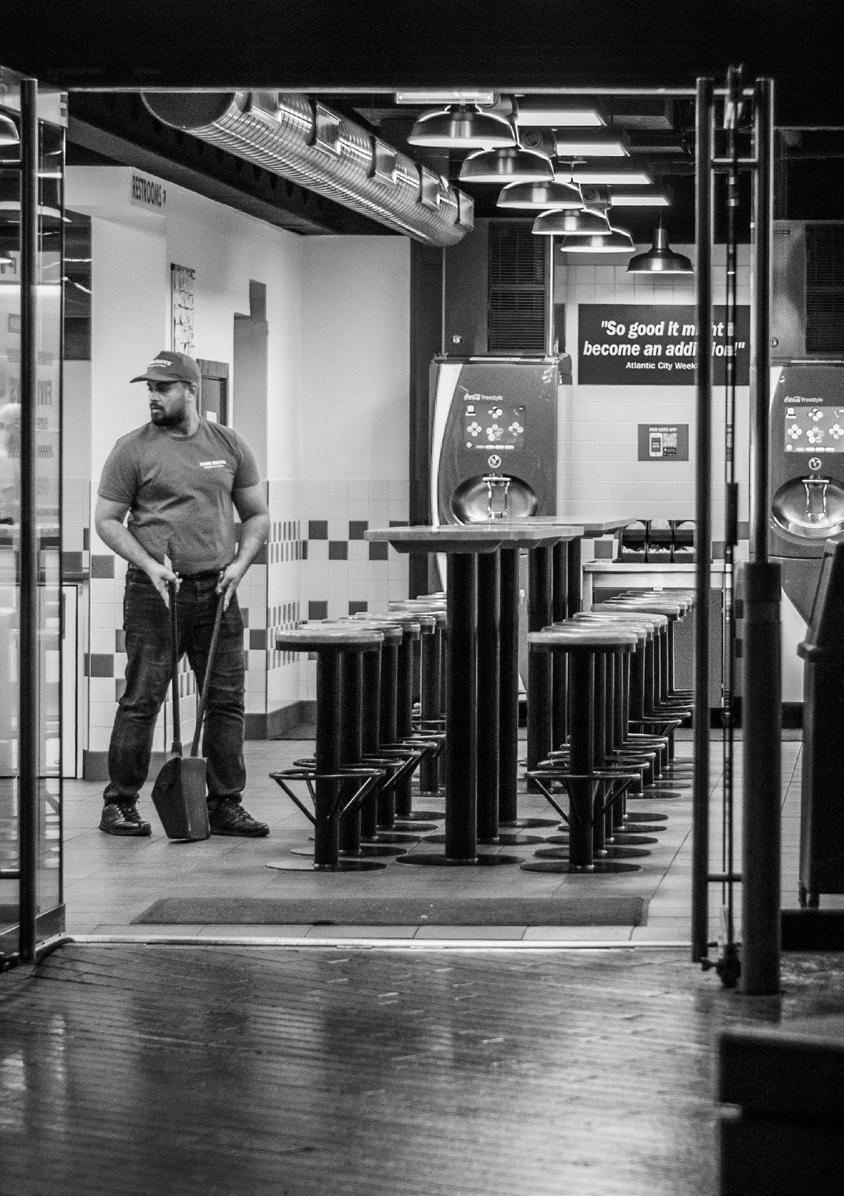
However, this view is rooted in the demonisation of the working class. Why should working hard in a nonacademic job mean failure just because it doesn’t lead to a prestigious career as a lawyer or doctor? Why is a job without prestige looked down upon? Since when did honest work become something to be scorned? Work provides pride and respectability, so why is a minimumwage job deemed acceptable at 16 but criticised at 26?
Would you judge Jasper, the private school-educated “nepo baby,” for quitting school to work at his father’s business? Probably not. But why is that?
This leads to the question: why is money valued over character? Perhaps this is why McDonald’s workers are looked down upon—they satisfy your hunger but are seen as nothing more. Does that make them unworthy, forgettable, or invisible?
We often think of invisibility as a superpower—a way to move unnoticed and do whatever we please. But in reality, being unseen and overlooked is tough. This is the life of the concierge who opens your door, the cleaner who makes your bed on holiday, and the janitor who ensures hospital corridors stay clean. They work for the benefit of others yet remain invisible and undervalued. This is known as the “invisible worker” phenomenon, where the work that keeps our world running is taken for granted.
In a society that measures worth by money and status, we need to reconsider what truly matters and start respecting all forms of hard work. Only then will we recognise that those working behind the scenes are the true backbone of our world, deserving of respect and appreciation. Next time you see an ‘invisible worker’, smile and say hello.
SPOTLIGHT: LATEST WITH LYDIA GERMAN

Our young people felt inspired and confident about making a positive impact after a recent ‘Industry Insight’ session. We hold these sessions as part of our Leadership Programme, where young people get an insight into different industries. This session, led by Lydia German gave valuable insights into the media and communications industry while giving young people the opportunity to ask questions and deepen their understanding of climate change, environmental conservation, and Lydia’s experiences with media interviews.
Lydia German is a Senior Communications and Content Officer at Lancashire Wildlife Trust and one of Youth Leads UK’s Trustees. Her journey began as a participant in the Leadership Programme, a crucial step that led her to her current role. Lydia is passionate about inspiring young people to create change and explore digital careers through non-traditional pathways. Having taken the BTEC route and completed an apprenticeship, she is a strong advocate for alternative approaches to education and career development.

Alumni member Raza, who was a participant in the Youth Leads UK Leadership Programme shares his experiences:
WHICH ASPECT OF LYDIA’S ROLE INTERESTED YOU THE MOST?
The aspect of Lydia’s role that interested me the most was how she uses her media and communications knowledge daily to positively influence public perception on various challenges and issues. It was fascinating to learn how her workdays are varied, with each day bringing new learning opportunities. Lydia’s role helps people understand complex topics such as climate change, government environmental policies, their impact on wildlife, and how political parties address environmental issues in their election manifestos. This was truly inspiring.
HOW HAS ATTENDING THIS INDUSTRY INSIGHT SESSION INFLUENCED YOUR THOUGHTS ABOUT A POTENTIAL CAREER IN THE MEDIA AND COMMUNICATION INDUSTRY?
Attending this Industry Insight session gave me a deeper understanding of the media and communication industry and demonstrated how organisations like Lancashire Wildlife Trust use media to raise awareness of environmental issues. It showcased the industry’s growth potential and importance. The session also highlighted the powerful role of social media, which is an area I’m particularly interested in. I learned how I could effectively use social media in a future career to raise awareness of other societal issues and create content that reaches a wider audience.
WHAT WAS ONE THING YOU TOOK AWAY FROM THIS INDUSTRY INSIGHT SESSION?
The main takeaway from the session was realising that every young and motivated individual has the capacity to achieve great things with a clear vision for change. Whether focusing on the environment, education, technology, or other areas, nurturing a visionary mindset is essential for driving impactful transformation.

FASHION
Step into the world of fashion through time! In this special edition, we’re taking you on a style journey from the iconic looks of the past to today’s bold trends and beyond. From vintage Victorian vibes to Y2K throwbacks and futuristic fits, it’s all about mixing the old with the new in the most exciting ways. Let’s dive into the past, present, and future of fashion!


of the
A vision
future: A sleek dress paired with delicate jewellery creates a refined, futuristic look. Bold shoes add a confident edge to this forward-thinking outfit.

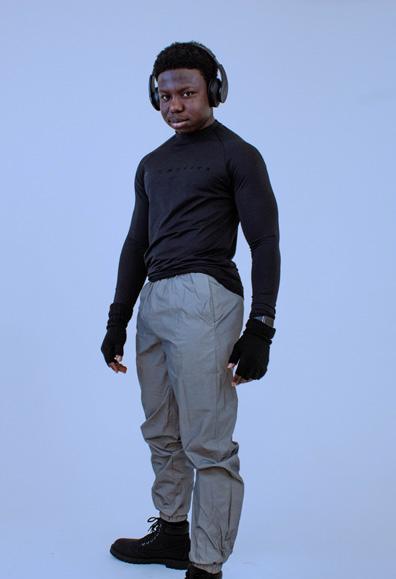
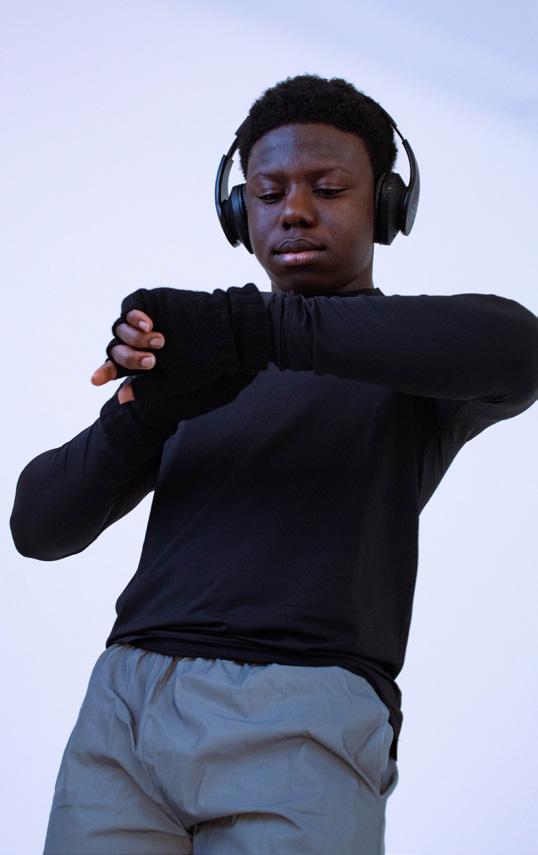
Shirt - £10.80 Boohoo
Gloves - £17.99 ASOS
Shoes - £27.00 Boohoo
ILLYAAS

Playful and polished: This look combines a stylish shirt and tailored shorts for a fresh, modern vibe. Accessories like a chic hairbow, a delicate necklace, and trendy sunglasses add a touch of charm, while sleek shoes complete the ensemble.

- £37.00
ASOS
Shorts - £18.00
ASOS
ASOS
ASOS
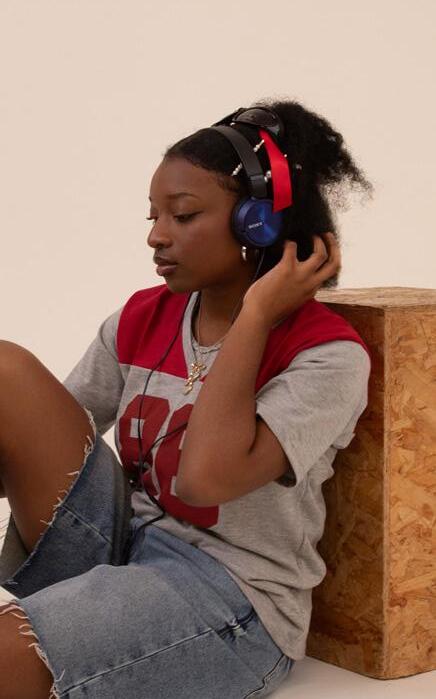
ASOS
Shirt
Hairbow - £8.00
Necklace - £6.00
Sunglasses - £6.00
Pretty Little Thing
Shoes- £26.00

Laid-back present-day cool: Keep it casual yet chic with a cosy jumper and classic jeans. Add a trendy tote bag to carry your essentials and complete the perfect everyday look.
HALEEMA

Tote bag - £9.00

Sunglasses - £20.00
Trousers - £25.50
Cover-up - £15.00 ASOS
TAHIRAH
Present-day style at its finest: Effortlessly stylish with a modern edge, this look pairs a chic shirt and tailored trousers with a flowy cover-up for a versatile outfit. Sleek sunglasses and statement shoes complete the ultimate present-day vibe.

Timeless elegance redefined: Step back into the past with a stunning vintage-inspired look. A classic dress paired with a charming headband and delicate accessories, all finished off with sleek shoes that bring a modern touch to old-world glamour.


Fashion editors: Jaweria Fatima, Safa Awadalla and Zenab Ahmad.
Photographed by Teegan Capper

Dress - £31.00
Headband - £5.99
New Look
Necklace - £8.00 ASOS
Shoes - £16.00 Boohoo
KIMI
HOW TO BECOME A LINKEDIN WARRIOR!
By Naziba Sheikh
Hey warriors-in-training! It’s time to strap on your virtual armour and prepare for battle - LinkedIn style. You might think, ‘Isn’t LinkedIn just for adults?’
Think again! In today’s digital age, you’re never too young to build your professional network.
Just remember, you need to be at least 16 to create a LinkedIn account. If you’re not quite there yet, don’t worry! You can still prepare with these tips for when the time comes.
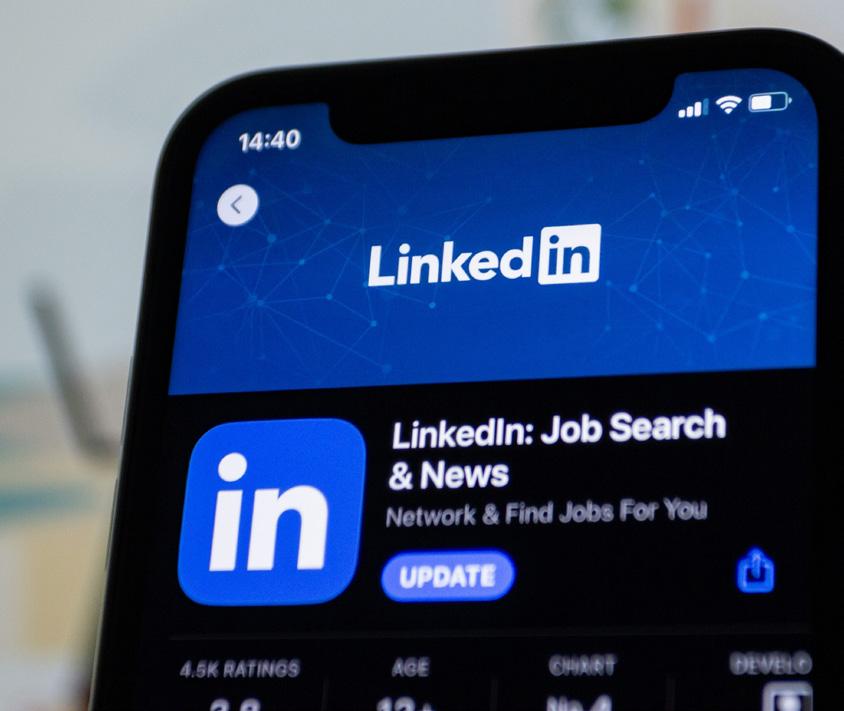
1 2
ARM YOURSELF WITH KNOWLEDGE
Before stepping into the professional battlefield, spend some time getting to know LinkedIn. Familiarise yourself with the platform’s rules and guidelines, browse the profiles of professionals in fields that interest you, and take note of what their profiles look like and the kind of content they share. Get inspired and gather ideas!
3 4
BUILD YOUR NETWORK
Every warrior needs allies, and LinkedIn is the perfect place to find them. Start by connecting with classmates, teachers, family friends, and professionals you admire. Remember, it’s not just about having a large network; quality is just as important as quantity. Personalise your connection requests with a friendly message explaining why you’d like to connect. Each LinkedIn connection is a valuable tool in your arsenal. One meaningful conversation could lead to mentorships, collaborations, or even job opportunities. Be bold!
Bonus Tip:
Make the most of LinkedIn’s amazing resources, including articles, videos, online courses, and webinars. Stay curious and don’t be afraid to ask questions!
Remember, becoming a LinkedIn warrior isn’t about being the biggest or the loudest, it’s about being strategic, authentic, and determined in the pursuit of your goals. So, gear up, young warriors, and let’s conquer the professional world together!
CRAFT YOUR PROFILE
Your LinkedIn profile is your armour. It should be polished, professional, and reflective of who you are. Make sure to include a professional photo showing your head and shoulders against a simple background looking at the camera, an engaging headline, and a summary that highlights your skills and aspirations. List relevant experiences like volunteer work or extracurricular activities. Don’t be afraid to let your personality shine, but always keep it appropriate for the professional space.
STEP INTO THE SPOTLIGHT
Engage with your network by joining conversations, participating in groups related to your interests or career goals, and sharing content that you find inspiring or relevant. Don’t hesitate to comment on posts or articles. It’s a great way to build relationships and get noticed by others in your field.

REVISE SMARTER, NOT HARDER: THE KEY TO ACADEMIC SUCCESS
By Zenab Ahmed

It’s never a bad time to revise - whether you are gearing up for A-levels, preparing for GCSEs or doing your mocks. As someone who completed their GCSEs last year, here are some tips to help you succeed:
TO-DO LISTS
One of the best ways to stay organised is by making a to-do list. You can write down your tasks in order of priority or colour-code them. For example, green for the most important and red for the least important. Ticking off tasks one by one can encourage you to complete everything by the end of the day, giving you a satisfying sense of accomplishment.
ACTIVE RECALL
Active recall involves actively trying to remember information, which helps strengthen your memory and makes it easier to retain what you’ve learned.
METHODS OF ACTIVE RECALL INCLUDE:
• Flashcards: Creating and reviewing flashcards helps your brain practise recalling answers through repetition.
• Past Papers: Completing past exam papers helps you understand what examiners look for by reviewing mark schemes.
• Teaching Someone: Explaining a topic to someone forces you to retrieve and organise information from your memory, reinforcing your understanding.
POMODORO TECHNIQUE
The Pomodoro Technique is a time management strategy where you work for 25 minutes and then take a 5-minute break, repeating this cycle to stay focused and productive. This method is perfect for maintaining motivation and avoiding burnout, as it combines focused work periods with regular breaks to keep you energised.
APP RECOMMENDATIONS




Seneca: Seneca offers notes and quizzes for various subjects, whether you’re studying for GCSEs or A-levels. It’s an excellent tool to practise active recall and reinforce your learning.
StudySmarter: This flashcard app is great for daily review. StudySmarter reminds you to go over your cards regularly, ensuring the information sticks. I found it especially helpful for revising science basics.
Knowunity: Knowunity is a platform where students can share notes on any subject. This saves time by allowing you to use notes created by other students as a basis for your own revision.
Remember, revision doesn’t have to be stressful! With the right tools and techniques, you can study smarter without feeling overwhelmed or burned out. Stay organised, take regular breaks, and use the tips above to ace your exams.
DOES THE NHS NEED MORE FUNDING?
By Maya Dobrowolski
We hear it time and time again: “Fund the NHS!” But why? From long waiting lists to the pressure of serving an ageing and increasingly demanding society, the NHS is being neglected, and our healthcare system is in crisis. Try picking up the phone to book a GP appointment and see how long it takes. Now, think about how long you’ll actually wait to see the doctor, if you even get to. According to NHS figures, 1 in 20 patients has to wait at least four weeks for a GP appointment. That’s four weeks too long—four weeks where symptoms can worsen.

So, you’ve finally got your appointment. Now what? Give it ten minutes before you’re rushed out the door, feeling disappointed because you didn’t have enough time to explain your symptoms. The result? There’s little they can do for you. It’s clear that our doctors are overloaded and overworked. The general public recognises the immense pressure the NHS is under, so why doesn’t the government? Decision-makers have often enjoyed the perks of private healthcare, remaining detached from the everyday struggles most of us face. This is why we have to keep advocating for change.

Some may ask,
“What will throwing more money at the NHS do? Isn’t it the fault of incompetent doctors?”
ABSOLUTELY NOT!
Many of us have experienced or heard stories of poor medical treatment, whether it’s being dismissed or encountering incompetence. This article isn’t about denying those experiences but highlighting deeper issues within the system. Funding should be directed towards training and retaining our doctors. Why? To stop them from leaving.
According to the General Medical Council (GMC) in 2023, around 4,000 doctors who gave up their licence to practise or left the medical register cited moving abroad as a reason. That’s 4,000 key workers lost due to unsatisfactory pay and working conditions. Is it really that serious? Yes. The NHS remains critically understaffed, which contributes to longer waiting times and rushed consultations. The demand far outweighs the number of available workers.
Training healthcare professionals, offering career progression opportunities, providing fair wages, and ensuring better working conditions are essential steps to keeping them here. Fair wages and decent working conditions are the minimum expectations for any job—why should it be any different for the people who form the backbone of our society?
WHAT IS THE COST OF “CUTENESS”? Is it Worth it?
By Hannah Yue

Brachycephalic (short-nosed) pet breeds have surged in popularity over the past decade in the UK, with three of the top eight most popular dog breeds fitting this category. People are drawn to their cuteness and distinctive personalities, but this popularity comes at a serious cost. Animals with severe genetic defects are continuously bred to meet human demands and aesthetic standards. Yet, these animals should not have to endure lifelong suffering and numerous health issues purely for human enjoyment.
WHICH BREEDS ARE BRACHYCEPHALIC?
DOGS:
• Bulldogs
• Pugs
• Shih Tzus
CATS:
• Persian
• Himalayan
• British Shorthair
RABBITS:
• Netherland Dwarfs
• Lop-eared rabbits
• Lionheads
WHAT ARE THE HEALTH PROBLEMS ASSOCIATED WITH BRACHYCEPHALIC ANIMALS?
The most common health issue is Brachycephalic Obstructive Airway Syndrome (BOAS), which causes breathing difficulties and overheating, often requiring surgery to ensure a reasonable quality of life. Other health problems include:
• Dental and eye issues due to skull deformities.
• Inflamed skin (dermatitis) resulting from skin folds.
• Difficulty sleeping and exercising because of impaired breathing.
• Higher susceptibility to genetic conditions, such as cancer, due to inbreeding.
• Complicated births, as many mothers cannot give birth naturally due to the mismatch between the large heads of the offspring and the mother’s birth canal, necessitating risky C-sections.
WHY SHOULD BREEDING BRACHYCEPHALIC ANIMALS BE BANNED?
Breeding brachycephalic animals should be prohibited to safeguard their welfare and prevent the creation of animals that endure severe health problems throughout their lives. However, advocating for a ban is complex.
One of the biggest obstacles is celebrity culture and social media, which promote flat faces, large heads, and big eyes as desirable traits in pets. Companies and celebrities frequently feature brachycephalic animals in advertising and branding, portraying them as ‘luxury’ or ‘designer’ pets. This encourages people to choose these breeds, fuelling demand. While their ‘cute’ features may attract us, animal welfare should come first. Relationships with pets should be based on love and responsible ownership, not on trends or status.
WHAT CAN YOU DO TO HELP?
If You’re Considering a New Pet:
• Choose a non-brachycephalic breed.
• Adopt from rescue centres whenever possible.
• Buy from responsible breeders. More information can be found here: Four Paws Guide to Responsible Breeders - www.four-paws.org.uk/our-stories/publications-guides/how-tofind-a-responsible-breeder
If You Already Own a Brachycephalic Pet:
• Take extra care of them. See the RSPCA’s advice on caring for brachycephalic animals
• Raise awareness by discussing the issue with friends, family, and anyone considering getting a new pet.
• Join campaigns like the RSPCA’s Save Our Breath, which supports a ban on breeding brachycephalic animals in the UK. Sign their petition - www.rspca.org.uk/getinvolved/ campaign/saveourbreath
FOLLOW @YOUTHLEADSUK for youth-led stories, leadership inspiration, and behind-the-scenes fun!

SCAN THE QR CODE TO FOLLOW US NOW! LET’S LEAD TOGETHER!
WOMEN’S FOOTBALL RISING IN POPULARITY – BUT AT WHAT COST?
By Kaitlyn Leeson
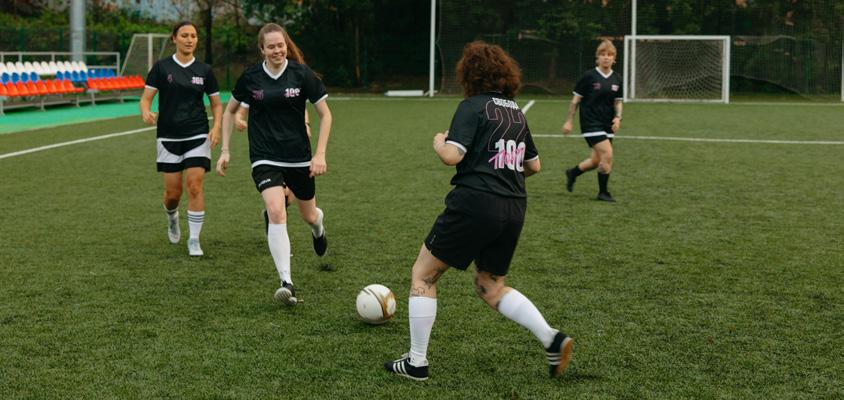
In recent years, women’s football has experienced tremendous success. Following the 2022 UEFA Women’s Euros and the 2023 FIFA Women’s World Cup, global interest in the women’s game has grown like never before. The 2023 World Cup saw record-breaking numbers, with almost two million fans attending. This was over 600,000 more than the previous tournament.
Despite this progress, the hate towards women’s football remains stubbornly persistent from my experience . From dismissive attitudes towards their achievements to rude and sexist comments on social media, why has this negative behaviour become so normalised?
One recent example involves discussions about the England team in relation to the 2024 Euros. It’s often said that England hasn’t reached the final of a major tournament in years, ignoring the fact that the women’s team not only reached the final of the 2023 World Cup but also won the Euros in 2022. Why is this achievement overlooked? The tournament structure is the same, and the accomplishment is just as impressive. So, why do so many choose to dismiss it?
A recent tweet also highlighted that Gareth Southgate is the only England manager to have reached two tournament finals. Yet this feat was already achieved by Sarina Wiegman, the manager of the England women’s team. Beth Mead, a star player who contributed to England’s 2022 Euros victory, responded to the tweet with “beg to differ,” effectively pointing out the oversight. However, her comment led to an influx of hate, with people arguing that the women’s game isn’t “real football” or isn’t significant enough to matter.
This is just the tip of the iceberg, and the problem runs much deeper. So, what can be done to combat this issue? Raising awareness by staying informed about women’s football and sharing posts that highlight these challenges could be a good starting point. Not only would this help tackle sexism, but it would also increase awareness of the achievements of women players.
As women’s football continues to grow year after year, the hope is that more people, including men, will be encouraged to watch and support their favourite teams. With more awareness and active efforts to counter negative comments, we can reduce the hatred and sexism directed at women’s football and create a more inclusive environment.
THE AGEING POPULATION THREATENED
AS ALZHEIMER’S
CASES RISE RAPIDLY!
By Illyaas Sowumni
WHAT IS ALZHEIMER’S DISEASE?
Alzheimer’s disease is a slowly developing condition that severely affects patients’ lives. In 2022 alone, it was responsible for 65,967 deaths in England and Wales according to Alzheimer’s Research UK. With no effective treatments currently available, it remains a key focus of medical research, especially as the ageing population means more cases are expected. This increase puts significant pressure on healthcare systems. Alzheimer’s is caused by the build-up of harmful proteins in the brain, leading to cognitive decline and brain tissue damage. Without new treatments, the number of people affected could be 1.4 million in 2040 according to the Alzheimer’s Society, making the search for a breakthrough more urgent than ever.


WHAT ARE THE VARIOUS STAGES AND SYMPTOMS?
Although Alzheimer’s disease is very complex and not fully understood, by the time symptoms are noticeable, significant brain tissue damage has already occurred. When someone develops Alzheimer’s before the age of 65, it’s called earlyonset Alzheimer’s, which is much less common than late-onset Alzheimer’s. The disease progresses through three main stages:
• Mild stage: Symptoms include wandering, getting lost, difficulty managing money, taking longer to complete everyday tasks, and changes in personality and behaviour due to reduced cognitive function. Most diagnoses are made during this stage.
• Moderate stage: This stage brings greater damage to language, reasoning, and sensory processing. Memory loss and confusion worsen, and it becomes harder for people to recognise friends and family. Symptoms may include hallucinations, delusions, and impulsive behaviour.
• Severe stage: Extensive brain tissue loss leads to complete dependence on others. Patients may become bedridden as their body gradually shuts down.

HOW IS ALZHEIMER’S DISEASE DIAGNOSED?
As noted, Alzheimer’s disease begins developing before any symptoms appear. Early diagnosis can help slow progression and ensure that the right support is in place. However, it can be difficult to diagnose because memory loss and cognitive decline are not always linked to Alzheimer’s. To confirm a diagnosis, doctors may use brain scans such as CT, MRI, or PET scans, which can identify changes in the brain and rule out other possible causes of symptoms.
WHAT DOES CURRENT RESEARCH SUGGEST?
Because Alzheimer’s poses a growing risk to the ageing population, research is focused on finding a cure as soon as possible. Potential new treatments include using nanoparticles to bypass the blood-brain barrier (which normally protects the brain) and altering gut bacteria to influence brain health. Recently, drugs have been developed to slow the disease’s progression, but their high costs often outweigh their limited benefits. Researchers are also studying genetic links, which could help prioritise treatment for people with a family history of Alzheimer’s.
WHERE TO GET SUPPORT
Early diagnosis is vital, so it’s important to seek help if any of the above symptoms are noticed. Information and resources can be found on the following websites:
• NHS website - www.nhs.uk/conditions/alzheimers-disease
• Alzheimer’s Society - www.alzheimers.org.uk
• Alzheimer’s Research UK - www.alzheimersresearchuk.org
SPARKLING SMILES: TOP DENTAL TIPS FOR YOUTH
By Muhammad Patel
Having a bright, healthy smile isn’t just about looking good – it’s also about feeling good and staying healthy. For young people, taking care of your teeth is crucial to avoid common issues like cavities, bad breath, and gum disease. Here are some essential tips for keeping your teeth in great shape.

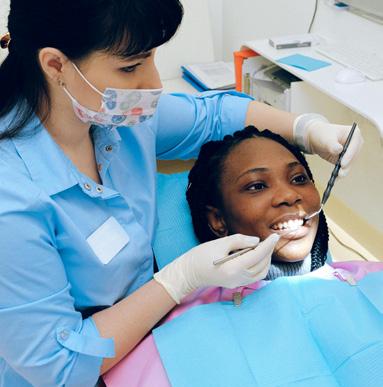
BRUSH LIKE A PRO
Brushing your teeth is the foundation of good dental hygiene. Here’s how to do it right:
1 2 3
Choose the Right Tools: Use a soft-bristled toothbrush and fluoride toothpaste. Soft bristles are gentle on your gums, while fluoride helps strengthen your tooth enamel.
Technique Matters: Hold your toothbrush at a 45-degree angle to your gums. Use gentle, circular motions to clean all the surfaces of your teeth – the front, back, and chewing surfaces. Don’t forget to brush your tongue to remove bacteria and keep your breath fresh.
Time It: Brush for at least two minutes, twice a day – once in the morning and once before bed. To help keep track, try using a timer or brushing along to a two-minute song.
DIET AND DENTAL HEALTH
What you eat plays a big role in your dental health. Here’s what you need to know:
Eat Tooth-Friendly Foods: Dairy products like milk, cheese, and yoghurt are rich in calcium, which helps build strong teeth. Crunchy fruits and vegetables, such as apples and carrots, can help clean your teeth as you chew.
Limit Sugary Snacks: Sugary foods and drinks, including sweets, fizzy drinks, and juice, can cause cavities. Try to limit these treats and choose healthier snacks like nuts, cheese, or fruit instead.
Drink Water: Water helps wash away food particles and keeps your mouth hydrated. Drinking water with fluoride can also help prevent tooth decay.
REGULAR DENTAL VISITS
Seeing your dentist regularly is important for maintaining oral health. Here’s why:
Ask Questions: Don’t be shy – ask your dentist any questions about your oral health. They can give you personalised tips and answer any concerns you have about caring for your teeth. 1 2 3 1 2 3
Routine Check-Ups: Visit your dentist at least twice a year for a professional cleaning and check-up. These visits can catch problems early, before they become serious.
What to Expect: During a dental visit, your dentist will check for cavities, gum disease, and other issues. They may take X-rays to get a closer look at your teeth and jaws. Professional cleanings remove tartar that regular brushing can’t.
FUN FACTS AND MYTHS
Taking care of your teeth is an important part of staying healthy but let’s share fun facts and clear up some common myths about dental health:
1. Fun Fact: Did you know that tooth enamel is the hardest substance in the human body, It’s even tougher than bone!
2. Fun Fact: Your mouth produces over 25,000 litres of saliva in a lifetime, which is enough to fill two swimming pools!
Myth: “If my teeth don’t hurt, they must be healthy.”
Reality: Dental issues like cavities and gum disease can develop without causing pain at first. Regular check-ups are important for finding problems early.
Myth: “Sugar is the only cause of cavities.”
Reality: While sugar is a big cause, other starchy foods like crisps and bread can also contribute to cavities.
WHAT IS THE SIGNIFICANCE OF BURUNDI?
By Misbah Akhtar

Have you ever heard of Burundi? If not, you’re not alone. Tucked away in East Africa, this small country often flies under the radar—but it has an important story to tell. Known as the world’s poorest nation, Burundi has a per capita Gross National Income of just $240, according to the Atlas method. To put this into perspective, the UK’s per capita GNI is around $50,000— over 200 times higher.
Both Burundi and its neighbour, Rwanda, were once colonised by Germany and later by Belgium, collectively known as Ruanda-Urundi during their time as a European colony. But why do colonial histories often involve countries that are now impoverished?
One significant factor behind Burundi’s poverty is its shortage of land and animals, alongside frequent natural disasters such as floods and droughts. These problems have severely impacted living conditions and economic stability. The COVID-19 pandemic further strained the economy, leading to more unemployment and informal work in urban areas. Sectors like tourism, which support many livelihoods, were hit hard, reducing income for the country.
Only 6% of Burundi’s total land is covered by forest, and more than half of that is made up of commercial plantations rather than natural forests.
Burundi consistently ranks as the poorest country in the world and remains among the least developed nations. It faces a wide range of issues, including extreme poverty, widespread corruption, political unrest, authoritarian rule, and high illiteracy rates. Decades of conflict have left Burundi in a fragile state, with lasting economic and human consequences, including the displacement of thousands of families. Its long period of international isolation has only deepened its challenges.
Burundi is a densely populated, almost surrounded by land country in East Africa, and over 70% of its people live in severe poverty. Food insecurity is a major problem: 52% of children under five suffer from stunted growth, and rural areas often experience even higher rates of malnutrition.
The country also faces a significant crime rate, with risks of armed robbery and theft. These include muggings involving firearms or knives, pickpocketing, break-ins, and vehicle thefts, sometimes carried out with weapons.
Burundi’s situation calls for greater global awareness and support. Sharing this information is one step towards helping the country. If you’ve learned something new, consider sharing it with others. Let’s be the change Burundi needs, supporting their journey towards a better future.

SPILLING THE BEAUTY SECRETS SPILLING THE BEAUTY SECRETS
Meet Samrin, the creative force behind the captivating looks from our recent fashion shoot. With a natural talent for enhancing natural beauty and a keen eye for the latest trends, Samrin brings a fresh perspective to the world of make-up at a young age. Join us as we delve into her journey from passion to profession and uncover the secrets behind her talent in this exclusive interview!

CAN YOU TELL US A BIT
ABOUT YOURSELF?
Hi! I’m Samrin, a young make-up artist (MUA). I love being innovative and creative, crafting intricate looks as well as more refined ones perfect for any event! I also share content on my Instagram and TikTok, documenting my journey and experiences as an MUA.
WHAT INSPIRED YOU TO PURSUE BEING A MAKE-UP ARTIST?
From a young age, I loved experimenting with face paint and creating fun looks. I first learned to do proper make-up on myself when I was 12. During lockdown, I took the time to practise on myself and my family, honing my skills. A few years later, I began doing make-up for friends for nights out, which they loved. This experience allowed me to work with different skin types and textures, which further fuelled my excitement for make-up. I improved through watching videos, practising on myself, and making gradual progress. Being self-taught was not easy, but I learned as I went along and continue to learn every day. I saw the transformative power of make-up and how it could make someone feel confident and happy. This inspired me to help those with low self-esteem feel beautiful and realise their inherent beauty—with or without make-up!
HOW DO YOU STAY UP-TODATE WITH CURRENT MAKE-UP TRENDS, ESPECIALLY THOSE POPULAR AMONG YOUTH?
Like many, I use TikTok, where I often spot the latest make-up trends and eye looks that inspire me to create cohesive looks for my page. Celebrities also play a significant role in shaping trends, and seeing what they popularise helps me understand what clients might want when choosing a look.

WHAT ROLE DO YOU THINK MAKE-UP PLAYS IN SELFEXPRESSION FOR TODAY’S YOUTH?
Make-up is a powerful tool for self-expression. As a Pakistani woman of colour, it can sometimes be hard to express my culture—through clothing or dance—where I live. Creating make-up looks inspired by my heritage helps me feel more connected and positive. Make-up also allows people to express their emotions and showcase their true selves. Your face becomes your canvas, giving you the freedom to display your individuality however you like!
WHAT ADVICE WOULD YOU GIVE TO YOUNG ASPIRING MAKE-UP ARTISTS LOOKING TO BREAK INTO THE INDUSTRY TODAY?
Start by practising your looks on yourself and others, and always believe in your potential. There were many times I doubted if I could make it in this career. Yet, just a year into my journey, my work was reposted by Makeup by Ariel (Kylie Jenner’s MUA) and noticed by Huda Kattan, which boosted my recognition. I also had the opportunity to contribute to the Youth Leads programme for a magazine fashion shoot. If you work hard, anything is achievable. Being a beginner is tough, but with practice, posting, and presenting your work, you can build a successful career too.
If you’re interested in make-up, follow Samrin at @beautybysamrin on Instagram and TikTok!
AUTISM AND ME
By Tahirah Majid
My name is Tahirah, and I want to share my experience of how autism affects my daily life. Some of my traits might be similar to other people with autism, but it’s important to know that everyone’s experience is different. I was diagnosed with autism later in life, and if I’d known earlier, I might have learned to manage it better. That’s why I’m sharing how autism can show up in different ways.
WHAT IS AUTISM?
Autism is a lifelong developmental condition that affects how people communicate and interact with others. It starts before a person is born. It’s important not to think of it as an illness or a disease. Autism is a spectrum, which means it can appear in different ways.
Some people with severe autism may be non-verbal or need support to go out. Others might be able to talk, make friends, and go out on their own but might struggle to understand social cues at first. There are also autistic people who live independently and have jobs. Even though we all have autism, we are all unique, with different personalities and experiences.
Autistic brains often process more information than non-autistic brains, making daily life feel more intense or chaotic. This can lead to difficulties understanding social cues or what’s considered socially acceptable, as our brains focus on dealing with sensory information.
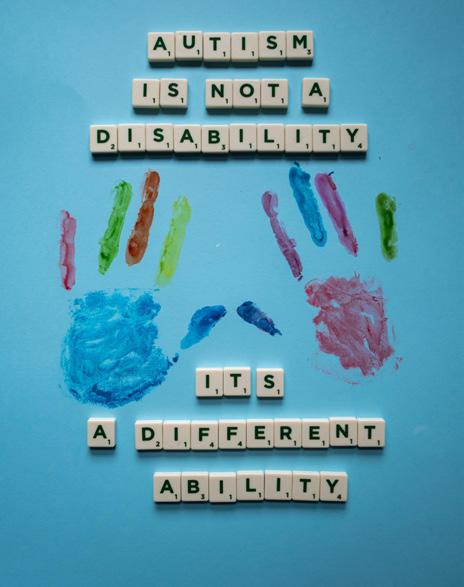
POSITIVE FEATURES OF AUTISM
Not all parts of autism are difficult or negative. Here are some positive traits that can come with being autistic:
• Attention to detail: Useful for focusing deeply on creative work or completing tasks.
• Acceptance of differences: Helps us be more empathetic and understanding of others.
• Absorbing and remembering facts: Good for researching and gaining knowledge that can be helpful later.
• Getting tasks done: Useful for managing time and meeting deadlines.
• Strong visual skills: Helpful for hands-on activities, like building a raft during an NCS programme, which needs coordination and creativity.
• Taking responsibility: Important for living independently and managing finances.
WHAT IT FEELS LIKE IN AN AUTISTIC BRAIN
Here’s a glimpse into what my thoughts might be like and how other autistic people might feel during everyday activities:
• Have they understood what I meant, or did I accidentally offend them?
• Will I ever get a moment to myself? I need to calm down.
• I know this person wants a response from me, but I’m not sure what to say
• It’s so noisy here, and I don’t have the energy for this, which makes it hard to focus.
• I don’t understand what’s happening, but if I say something, they might think I’m being difficult.
• I need a break, or I’ll burn out. I’m feeling overwhelmed and overstimulated.
It’s okay to have these thoughts. Here are some things I do to manage them:
• Take a few deep breaths.
• Step away from the situation if possible. If not, listening to music or going for a walk can help.
• Drink some water.
These tips might not work for everyone, so it’s important to find what works best for you. Remember, I believe you can handle anything if you try and don’t give up!
If you need support, please contact your GP or reach out to Samaritans on 116 123 or email jo@samaritans.org.
COMMON AUTISTIC TRAITS
Difficulty initiating and maintaining conversations
Differences in gestures, facial expressions, and eye contact
Over- or underresponsiveness to sensory input
Struggles with transitions or changes in routine
Intense focus on specific topics or objects
Challenges with understanding social norms
Repeated motor movements, speech, or routines
Differences in support needs
THE ERAS TOUR SPARKS ECONOMIC ‘GOLD RUSH’ IN CITIES WORLDWIDE
By Lucy Tallon

The Eras Tour, headlined by Taylor Swift, has had a remarkable positive impact on the economies of UK cities hosting her performances. For those unfamiliar, The Eras Tour is an extraordinary concert series celebrating all of Swift’s musical eras, featuring songs from every album she’s released. This “Taylor Swift effect” illustrates how large-scale entertainment events can revitalise local economies.
Take London, for example. The city experienced a significant boost during Swift’s six-night residency at Wembley Stadium in June 2024, generating an estimated £100 million for the local economy. Hotels reported occupancy rates close to 98%, far higher than usual. Restaurants, bars, and shops saw an unprecedented surge in business, with many establishments noting record sales during the concert dates. Fans, many travelling from other parts of the UK or abroad, contributed to this economic boom by spending on accommodation, dining, and shopping. On those nights, it seemed London was truly “dancing around the kitchen in the refrigerator light” of newfound prosperity.

Dublin also felt a notable economic uplift. During Swift’s two-night performance at the Aviva Stadium, the city’s economy was bolstered by approximately £30 million. The hospitality and retail sectors reported a significant increase in customer traffic, with hotels fully booked and restaurants and shops bustling with activity. Local transport services also experienced a surge in usage, reflecting the influx of visitors. Dublin’s economy, it could be said, was “feeling 22” again. According to an analysis by the Bank of Ireland, spending among 13- to 17-year-olds increased by 63% compared to the previous weekend.
Edinburgh was another city that reaped the benefits of hosting the Eras Tour. Swift’s two-night performance at Murrayfield Stadium brought an estimated £35 million to the local economy. Hotels were booked solid well in advance, and local eateries and shops saw a marked increase in patronage. Many concertgoers extended their stay to explore the city’s attractions, boosting tourism revenue. The city was clearly “enchanted” by this influx of business.
Liverpool experienced a unique aspect of the tour through the “Taylor Trail,” which encouraged fans to explore the city while participating in Swift-themed activities. This initiative not only attracted visitors but also prompted them to spend more time and money in the city, enhancing local businesses’ prosperity.
Beyond the immediate economic benefits, Swift made secret, significant donations to food banks in each city she visited, funding them for an entire year. This generous act, revealed by charity staff, provided more support than the government has ever given. Swift’s actions highlight her dedication to the communities she visits, creating a “Love Story” of kindness and support.
The tour’s positive impact extended to employment as well. Temporary jobs created by the concerts, including event staffing, security, and merchandise sales, provided additional income for local residents. Local vendors and small businesses involved in event logistics also benefited greatly, further boosting the economy. According to research by Barclays, the spending habits of Swift’s fans suggest that her concerts could generate up to £1 billion (€1.18 billion) for the UK economy, not to mention the added benefits for other European countries and the US leg of the tour, where Swift’s fanbase is largest.
The Eras Tour has clearly energised the economies of UK cities hosting the concerts. By attracting large crowds who spend on accommodation, dining, transportation, and shopping, the tour promotes economic activity and boosts tourism. The ripple effects ensure long-term benefits, enhancing the cities’ reputations and encouraging future events and visitors. As Taylor herself might say, these cities are “ready for it.”


STAND UP, STAND OUT, DO SOMETHING DIFFERENT!
LEARN NEW SKILLS, CONFIDENCE, AND THE CHANCE TO CREATE REAL CHANGE IN YOUR COMMUNITY. Follow us @YouthLeadsUK on socials for updates. SCAN THE QR CODE TO FIND OUT MORE AND APPLY TODAY!
• Gain employability skills (e.g., CV writing, interview prep).
• Work on creative projects like magazine production and fashion shoots.
• Carry out a Social Action Project to make a difference in your community.
• Access exclusive opportunities, including the Duke of Edinburgh’s Award.
• Have something to say? Write an article for this magazine and get published!
Supported by




